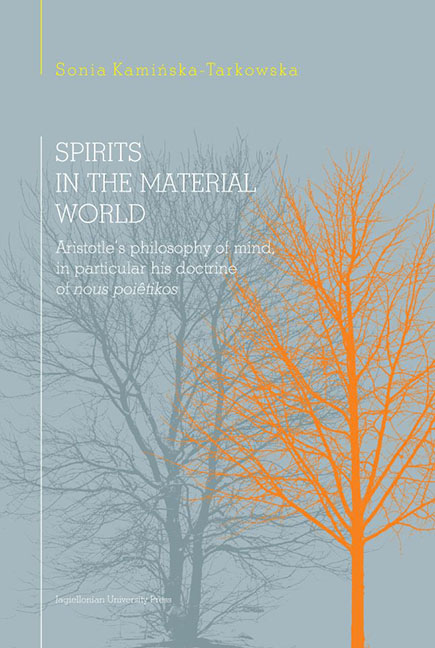 Spirits in the Material World
Spirits in the Material World Thomistic Interpretations
Published online by Cambridge University Press: 14 October 2023
Summary
Christian Aristotelianism and Creationism
The Middle Ages bring yet another change and it is mostly due to the Christian Aristotelianism represented by the person of Thomas Aquinas (1225–1274). This is, of course, a bit of a simplification, because for instance the Franciscan school accepted other senses of agent intellect, and I will come back to that later on. Nevertheless, the position of Aquinas is still among the most popular interpretations of Aristotle’s psychology. He believed that nous poiêtikos was an immaterial faculty of man, together with passive mind, building up an intellectual soul and without a bodily organ. It was created and incarnated by God and is immortal. It is individual for every human being. I find it worthwhile that Aquinas is instead in agreement with Theophrastus, which may indicate that some of the ideas usually ascribed to medieval interpretations of Aristotle stem from the Stagirite’s immediate followers. But, there is a significant difference that must not be overlooked: Aquinas is a theist, this means that he believes that God is a person. And that would be unacceptable in antiquity. If an ancient god was a person, it would have been an Olympic god and when it comes to those, it must be stressed that Aristotle spoke of them in a metaphorical way, while commenting on our good or bad luck in life (eutychia), and they had little or nothing to do with the first principle of all things. Deity was not a person, as this would deprive it of perfection, to say the least. Coming back to Aquinas, he also claimed that God created us and equipped us with this divine intellect during our foetal development (perfecta dispositio corporis). This is a possible rendition of Aristotle’s concept of the divine seed (theion sperma) from De generatione animalium 2.3. Aquinas spitefully, but amusingly called Averroës ‘a despoiler of Peripatetic philosophy’ and the Renaissance Averroists criticised him in return.
The Thomistic paradigm was undoubtedly long-lasting, maintained also by the nineteenth-century philosophers who belonged to the so-called ‘Aristotelian revival’.
- Type
- Chapter
- Information
- Spirits in the Material WorldAristotle's Philosophy of Mind in Particular His Doctrine of Nous Poiêtikos, pp. 55 - 96Publisher: Jagiellonian University PressPrint publication year: 2022
